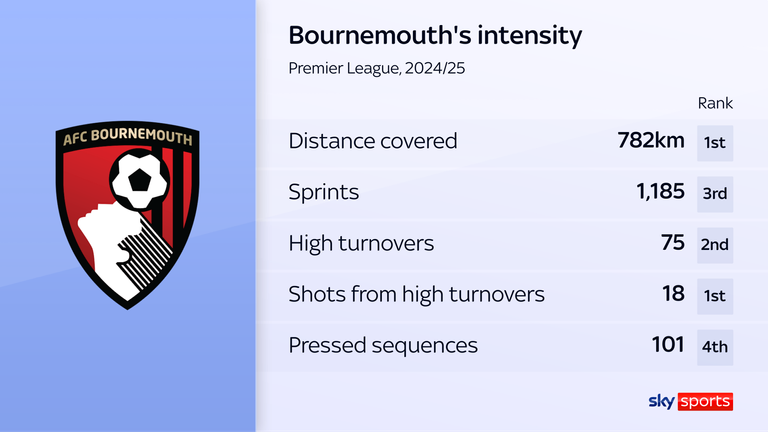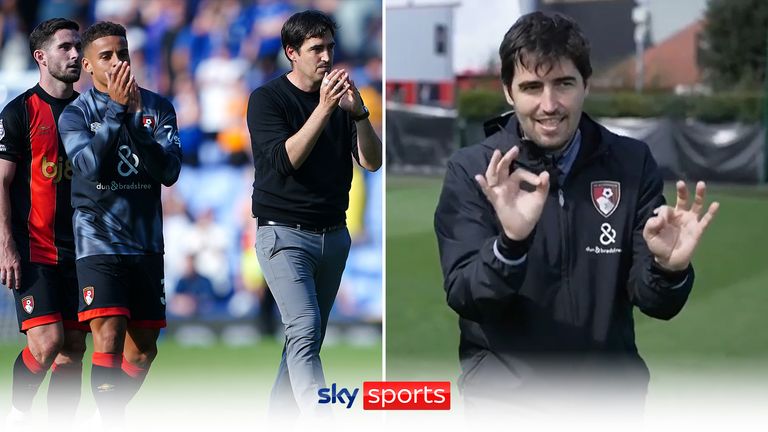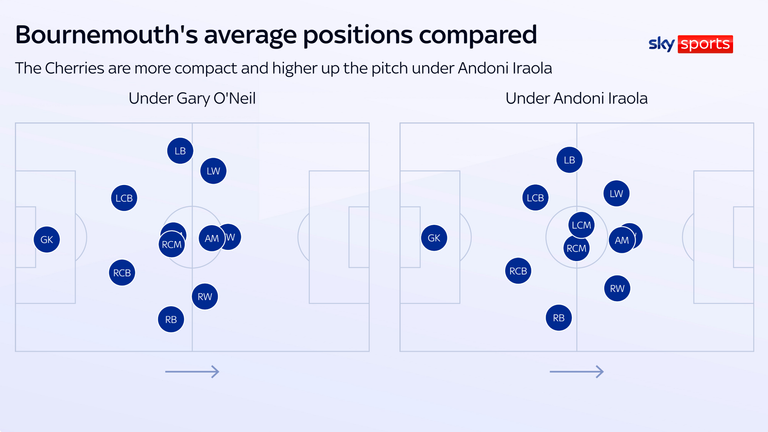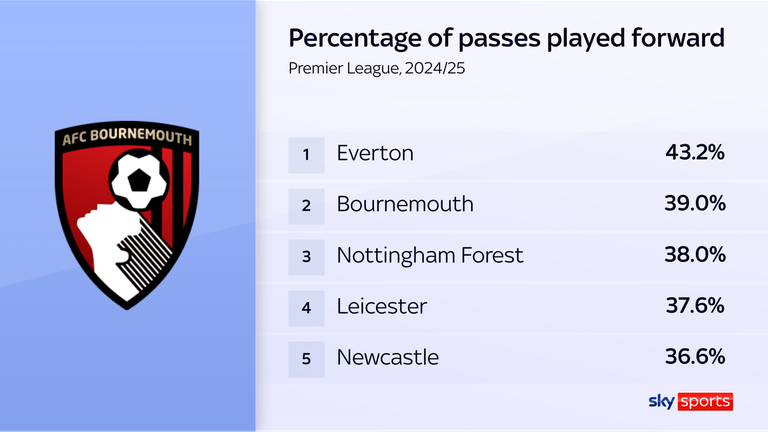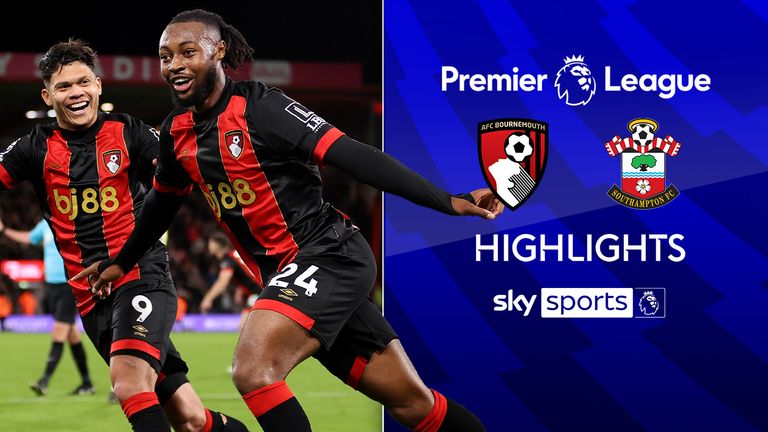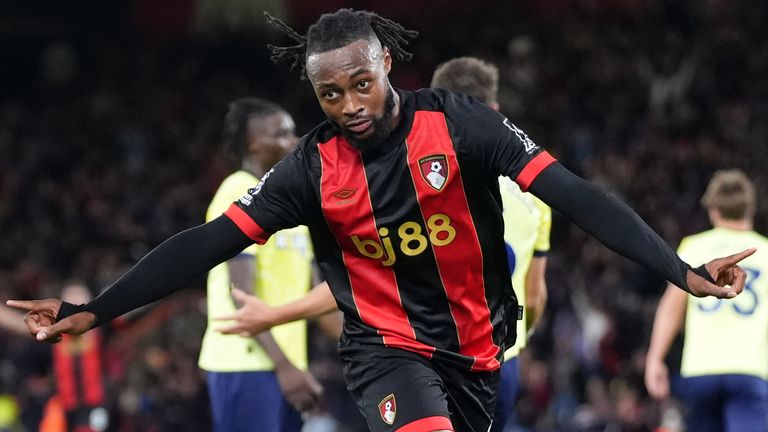[ad_1]
This time last season, Bournemouth sat 19th in the Premier League without a win in seven games. It is a measure of how far they have come under Andoni Iraola that, despite being five points and six places better off, the prevailing mood is one of frustration.
Their 1-0 loss to Leicester before the international break, when they had 19 shots to the Foxes’ six, was one of numerous games this season in which the result did not match their performance level. Remarkably, expected goals data indicates they should be fourth.
“For me, there is a good side to that stat and a very bad side,” head coach Andoni Iraola tells Sky Sports in an office inside the Vitality Stadium ahead of Saturday’s visit of Arsenal.
“The most important thing is the ‘if’. If we could match our expected goals, we would be fourth. But the problem is we haven’t been able to, so there is something that we have to improve, to become a more efficient team. That is something we are trying to focus on.”
Iraola will hope to see progress against Arsenal. But 16 months on from his appointment, he has already succeeded in implementing a playing style described by one old colleague as “rock and roll”. This Bournemouth side, furiously intense, often chaotic and always committed to attacking at speed, now bear his DNA.
Hard running and high pressing
Iraola takes immense satisfaction from seeing Bournemouth top among Premier League clubs for distance covered this season. It is a testament to the buy-in and work-rate of his players. As he explains, though, there is also purpose behind it.
“This is something that we cannot lose,” he says. “It’s kind of our identity. We try to make things happen. Sometimes it will happen against us, but you have to take some risks.
“We like to prioritise this kind of volume in our running because we feel that in games which are quite close, where one small chance can make the difference, we are not so good.
“Most of the games that we win are the games that are more open, where there are more chances, where we can exploit one-against-ones on the outside and find bigger spaces, because attacking small spaces is probably not our strength.”
It took time for the players to acclimatise to his demands. The Cherries did not win any of his first nine Premier League games in charge last year. But fitness levels soon increased and the club’s recruitment, targeting younger players, has been tailored to suit his approach.
“It is partly about getting used to it in training, but also, we now have one of the youngest squads in the league,” says Iraola. “You have to play to your strength and that is why it helps to have a young team with players who can play with high energy, in a high rhythm.
“There are probably times when we suffer, experience-wise, especially with our defenders, because a lot of them – Zaba [Illia Zabarnyi], Milos [Kerkez], [Julian] Araujo, Dean Huijsen – are very young. But they give us the ability to defend big spaces and cope with those situations.”
Defending those spaces is crucial when committing so many bodies forward to press, another tenet of Iraola’s approach. Bournemouth rank second for high turnovers this season and top for high turnovers leading to shots, although he sees room for improvement.
“I think we are getting better,” he says of their pressing game. “This season we are recovering a lot of balls high up the pitch, but we are not translating this into goals.
“Last season, we had some months where we were recovering the ball and straight away scoring goals in a lot of these transitional moments.
“This season, we are not taking benefit in terms of numbers of goals. I hope we can continue doing these good things, but make them count. It’s not about just recovering the ball high, it’s about using these, what I would call, ‘high-quality balls’ to make the difference.”
Pushing further up the pitch
Last season’s 3-0 win over Manchester United at Old Trafford is one example of when they have managed to do that.
Their first goal that day, when Lewis Cook, ostensibly their deepest-lying midfielder, stole possession near the box and crossed for Dominic Solanke to score, highlighted the extent of the aggression demanded by Iraola off the ball. Bournemouth’s high press is not just a matter for their attacking players.
“That is key for us,” he says. “Especially, I would say, against better opposition. The better the opposition, the more risk you have to take if you want to press them.
“You know, sometimes people say, ‘They are very good, so we have to wait a little bit longer to press.’ But that way you have zero chance to recover that ball.
“I think you have to take even more risk if the opponent are better on the ball, because in situations where most teams will feel the pressure, Arsenal, for example, will probably not feel it in the same way, and we will find it more difficult to recover the ball.
“So, sometimes we have to get used to seeing Lewis in the opposition box, even [centre-back] Marcos Senesi sometimes follows in to the edge of the box.
“It’s a risk that we think is good for us. Obviously, sometimes it will not work. But it’s the way we want to do things.”
Iraola has brought Bournemouth higher up the pitch in possession as well as out of it. Under his predecessor, Gary O’Neil, the average start distance of their passing sequences was the second-lowest in the division. This season, it is the fifth highest, up from eighth last term.
“We tried to reinforce this during the summer,” says Iraola.
“Last season, we played a little bit higher than they used to play before, but I think we still needed to support the forwards more, because if you want to press high, you have to be very compact and not leave space in between the lines for the midfielders.
“We are probably not as extreme as, I don’t know, Aston Villa or Spurs, where their defenders go straight away to the halfway line every time, but we need to be quite brave. Otherwise, it’s too much for our midfielders to cover everything.”
Quick and direct attacks
While some Premier League sides favour slow, methodical approach play, Bournemouth are unashamedly direct. Opta’s advanced metrics show they attack at a higher speed than any other team in the division. Transitions are targeted as moments of opportunity.
“The first thing we try to do when we recover the ball is play to the number nine, because that is usually the moment when the opponent is less well positioned and you can find better spaces,” says Iraola.
“You can’t always do it. Sometimes, you have to attack in a more, let’s say, ‘organised’ way, like every team. But this is another of our characteristics.
“For me, as coach, it was a change arriving in the Premier League. La Liga is not a slow pace, but it’s a more possession-orientated game. Here, I would say it’s more transitional.
“I think, probably, we could have been even more aggressive in those situations last season. That cost us in some games. But now everyone understands what we are trying to do.
“That is another challenge, because every team is ready for everything. The quality of coaching in the Premier League is top, and it becomes more difficult to make the difference.”
Not that it stops him from trying. Iraola detailed his dislike for “security passes” in an interview with Sky Sports before his arrival in the Premier League. The emphasis he places on directness can now be seen in the percentage of passes Bournemouth play forward.
Adapting from Solanke to Evanilson
Those forward passes are now aimed towards Evanilson, a £40m club-record signing from Porto, rather than the departed Solanke. The Brazil international has made a tentative start but faces Arsenal on Saturday hoping to build on his first goal for the club against Southampton.
“It’s a challenge for us to replace Dom,” says Iraola. “Not only for me as a manager, but also for the team collectively because we have to get used to different players.
“We have to get used to playing to Evanilson’s strengths, to use the kind of movements he is more comfortable with. We know this will take time because he is not the same player as Dom.
“The goal he scored against Southampton came from a movement that he does a lot, between the centre-backs, attacking those spaces, whereas Dom used to go wide more, using the channels. There are small things that we have to learn from each other.
“I hope that with more minutes, with the confidence of playing with each other, we can profit not just from the strengths of Evanilson but everyone.”
Bournemouth’s wastefulness in front of goal this season is, after all, a collective issue. According to Opta, they have scored roughly four goals fewer than they should have, based on the quality of chances they have created. Iraola is trying to change attitudes.
“For me, it’s a lot about the mentality,” he says, “to avoid thinking, ‘We are having a good volume, it doesn’t matter if I miss this chance, I will have another one in five or 10 minutes.’
“The key is to treat every chance like it’s the last one you will have in this game. Defensively, it’s the same. I think we are defending quite well, but you can’t defend quite well, not allow a lot of chances, and then make a big mistake that gives away a goal.
“The big teams have the same focus for 100 minutes in every game. They cannot allow one mistake, they cannot allow missing one-on-one against the ‘keeper. We have to be the same.”
Changing the record against top teams
The challenge now is to put it all into action against top opposition. Bournemouth are embarking on a daunting run, with Aston Villa and Manchester City to come after Arsenal. They go into it having not won any of their 14 meetings with last season’s top six under Iraola.
“We analysed last season and I think we were very good against teams a little bit below Arsenal, City and Liverpool,” says Iraola.
“Against Villa, against Manchester United, against Newcastle, against Chelsea, we have played well and had some results. But it’s true that when we have had to face the top three, we haven’t been able to take any points. Obviously, it’s not only us. They are used to winning most games.”
Nevertheless, Bournemouth’s record raises inevitable questions about Iraola’s approach. Can his high-risk style work against elite sides? Does it need to be tempered? He points to his record in Spain.
“I feel the way we play can give us the results we want,” he says. “I had very good results against Barcelona and Real Madrid playing in the same way.
“Obviously, every situation is different. But my belief when you play these teams is that you shouldn’t give them too much respect, because if you are afraid, if you change your identity, it is only a matter of time until they score against you.
“Obviously we have to adapt certain things. We have analysed what these teams do, to try to make them play in areas they probably don’t want to play in. But we don’t want to change too much.
“In the end, we have to play our game.”
Watch Bournemouth vs Arsenal live on Sky Sports Premier League and Main Event from 5pm on Saturday; kick-off 5.30pm
[ad_2]
Source link
